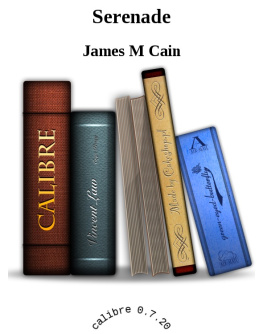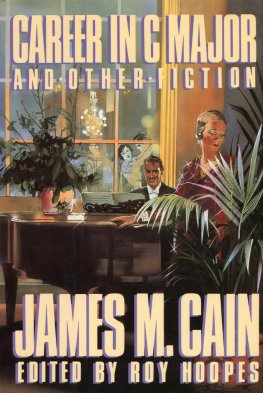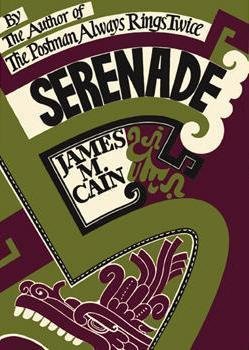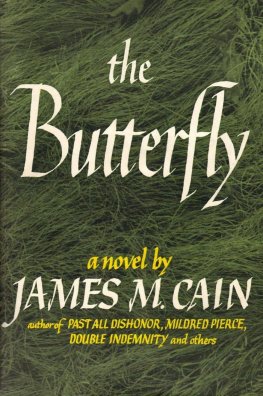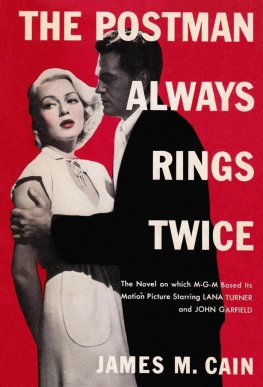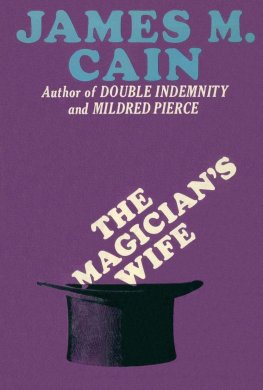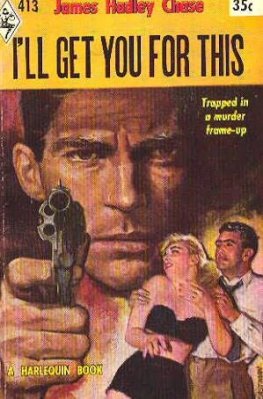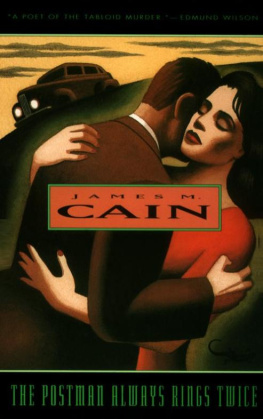James M. Cain - Mildred Pierce
Here you can read online James M. Cain - Mildred Pierce full text of the book (entire story) in english for free. Download pdf and epub, get meaning, cover and reviews about this ebook. genre: Prose. Description of the work, (preface) as well as reviews are available. Best literature library LitArk.com created for fans of good reading and offers a wide selection of genres:
Romance novel
Science fiction
Adventure
Detective
Science
History
Home and family
Prose
Art
Politics
Computer
Non-fiction
Religion
Business
Children
Humor
Choose a favorite category and find really read worthwhile books. Enjoy immersion in the world of imagination, feel the emotions of the characters or learn something new for yourself, make an fascinating discovery.
- Book:Mildred Pierce
- Author:
- Genre:
- Rating:3 / 5
- Favourites:Add to favourites
- Your mark:
- 60
- 1
- 2
- 3
- 4
- 5
Mildred Pierce: summary, description and annotation
We offer to read an annotation, description, summary or preface (depends on what the author of the book "Mildred Pierce" wrote himself). If you haven't found the necessary information about the book — write in the comments, we will try to find it.
Mildred Pierce — read online for free the complete book (whole text) full work
Below is the text of the book, divided by pages. System saving the place of the last page read, allows you to conveniently read the book "Mildred Pierce" online for free, without having to search again every time where you left off. Put a bookmark, and you can go to the page where you finished reading at any time.
Font size:
Interval:
Bookmark:
MILDRED PIERCE by James M. Cain
First published in 1941
CHAPTER I
IN THE SPRING of 1931, on a lawn in Glendale, California, a man was bracing trees. It was a tedious job, for be had first to prune dead twigs, then wrap canvas buffers around weak branches, then wind rope slings over the buffers and tie them to the trunks, to hold the weight of the avocados that would ripen in the fall. Yet, although it was a hot afternoon, he took his time about it, and was conscientiously thorough, and whistled. He was a smallish man, in his middle thirties, but in spite of the stains on his trousers, he wore them with an air. His name was Herbert Pierce. When he had finished with the trees, he raked the twigs and dead branches into a pile, carried them back to the garage, and dropped them in a kindling box. Then he got out a mower and mowed the lawn. It was a lawn like thousands of others in southern California: a patch of grass in which grew avocado, lemon, and mimosa trees, with circles of spaded earth around them. The house, too, was like others of its kind: a Spanish bungalow, with White walls and red-tile roof. Now, Spanish houses are a little outmoded, but at the time they were considered hightoned, and this one was as good as the next, and perhaps a little bit better. The mowing over, he got out a coil of hose, screwed it to a spigot, and proceeded to water. He was painstaking about this too, shooting the water all over the trees, down on the spaded circles of earth, over the tiled walk, and finally on the grass. When the whole place was damp and smelled like rain, he turned off the water, pulled the hose through his hand to drain it, coiled it, and put it in the garage. Then he went around front and examined his trees, to make sure the water hadn't drawn the slings too tight. Then he went into the house. The living room he stepped into corresponded to the lawn he left. It was indeed the standard living room sent out by department stores as suitable for a Spanish bungalow, and consisted of a crimson velvet coat of arms, displayed against the wall; crimson velvet drapes, hung on iron spears; a crimson rug, with figured border; a settee in front of the fireplace, flanked by two chairs, all of these having straight backs and beaded seats; a long oak table holding a lamp with stained-glass shade; two floor lamps of iron, to match the overhead spears, and having crimson silk shades; one table, in a corner, in the Grand Rapids style, and one radio, on this table, in the bakelite style. On the tinted walls, in addition to the coat of arms, were three paintings: one of a butte at sunset, with cow skeletons in the foreground; one of a cowboy, herding cattle through snow, and one of a covered-wagon train, plodding through an alkali flat. On the long table was one book, called Cyclopedia of Useful Knowledge, stamped in gilt and placed on an interesting diagonal. One might object that this living room achieved the remarkable feat of being cold and at the same time stuffy, and that it would be quite oppressive to live in. But the man was vaguely proud of it, especially the pictures, which he had convinced himself were "pretty good." As for living in it, it had never once occurred to him. Today, he gave it neither a glance nor a thought. He hurtied through, whistling, and went back to a bedroom, which was ifiled with a seven-piece suite in bright green, and showed feminine touches. He dropped off his work clothes, hung them in a closet, and stepped naked into the bathroom, where he turned on water for a bath. Here again was reflected the civilization in which he lived, but with a sharp difference. For whereas it was, and still is, a civilization somewhat naive as to lawns, living rooms, pictures, and other things of an 'aesthetic nature, it is genius itself, and has forgotten more than all other civilizations ever knew, in the realm of practicality. The bathroom that he now whistled in was a utile jewel: it was in green tile and white tile; it was as clean as an operating room; everything was in its proper place and everything worked. Twenty seconds after the man tweaked the spigots, he stepped into a bath of exactly the temperature he wanted, washed himself clean, tweaked the drain, stepped out, dried himself on a clean towel, and stepped into the bedroom again, without once missing a bar of the tune he was whistling, or thinking there was anything remarkable about it. After combing his hair, he dressed. Slacks hadn't made their appearance then, but gray flannels had: he put on a fresh pair, with polo shirt and blue lounge coat. Then he strolled back to the kitchen, a counterpart of the bathroom, where his wife was icing a cake. She was a small woman, considerably younger than himself; but as there was a smear of chocolate on her face, and she wore a loose green smock, it was hard to tell whal she looked like, except for a pair of rather voluptuous legs that showed between smock ana shoes. She was studying a design, in a book of such designs, that showed a bird holding a scroll in its beak, and now attempted a reproduction of it, with a pencil, on a piece of tablet paper. He watched for a few moments, glanced at the cake, said it looked swell. This was perhaps an understatement, for it was a gigantic affair, eighteen inches across the middle and four layers high, covered with a sheen like satin. But after his comment he yawned, said: "Well--don't see there's much else I can do around here. Guess I'll take a walk down the street." "You going to be home for supper?" "I'll try to make it, but if I'm not home by six don't wait for me. I may be tied up." "I want to know." "I told you, if I'm not home by six--" "That doesn't do me any good at all. I'm making this cake for Mrs. Whitley, and she's going to pay me three dollars for it. Now if you're going to be home I'll spend part of that money on lamb chops for your supper. If you're not, i'll buy something the children will like better." "Then count me out." "That's all I want to know." There was a grim note in the scene that was obviously out of key with his humor. He stood around uncertainly, then made a bid for appreciation. "I fixed up those trees. Tied them up good, so the limbs won't bend down when the avocados get big, the way they did last year. Cut the grass. Looks pretty, nice out there." "You going to water the grass?" "I _did_ water it." He said this with quiet complacency, for he had set a little trap for her, and she had fallen into it. But the silence that followed had a slightly ominous feel to it, as though he himself might have fallen into a trap that he wasn't aware of. Uneasily he added: "Gave it a good wetting down." "Pretty early for watering the grass, isn't it?" "Oh, one time's as good as another." "Most people, when they water the grass, wait till later in the day, when the sun's not so hot, and it'll do some good, and not be a waste of good water that somebody else has to pay for." "Who for instance?" "I don't see anybody working around here but me." "You see any work I _can_ do that I _don't_ do?" "So you get done early." "Come on, Mildred, what are you getting at?" "She's waiting for you, so go on." "Who's waiting for me?" "I think you know." "If you're talking about Maggie Biederhof, I haven't seen her for a week, and she never did mean a thing to me except somebody to play rummy with when I had nothing else to do." "That's practically all the time, if you ask me." "I wasn't asking you." "What do you do with her? Play rummy with her a while, and then unbutton that red dress she's always wearing without any brassieres under it, and flop her on the bed? And then have yourself a nice sleep, and then get up and see if there's some cold chicken in her icebox, and then play rummy some more, and then flop her on the bed again? Gee, that must be swell. I can't imagine anything nicer than that." His tightening face muscles showed his temper was rising, and he opened his mouth to say something. Then he thought better of it. Then presently he said: "Oh, all right," in what was intended to be a lofty, resigned way, and started out of the kitchen. "Wouldn't you like to bring her something?" "Bring her--? What do you mean?" "Well, there was some batter left over, and I made up some little cakes I was saving for the children. But fat as she is, she must like sweets, and--here, I'll wrap them up for her." "How'd you like to go to hell?" She laid aside the bird sketch and faced him. She started to talk. She had little to say about love, fidelity, or morals. She talked about money, and his failure to find work; and when she mentioned the lady of his choice, it was not as a siren who had stolen his love, but as the cause of the shiftlessness that had lately come over him. He broke in frequently, making excuses for himself, and repeating that there war no work, and insisting bitterly that if Mrs. Biederhof had come into his life, a guy was entitled to some peace, instead of a constant nagging over things that lay beyond his control. They spoke quickly, as though they were saying things that scalded their mouths, and had to be cooled with spit. Indeed, the whole scene had an ancient, almost classical ugliness to it, for they uttered the same recriminations that have been uttered since the beginning of marriage, and added little of originality to them, and nothing of beauty. Presently they stopped, and he started out of the kitchen again, but she stopped him. "Where are you going?" "Would I be teffing you?" "Are you going to Maggie Biederhof's?" "Suppose I am?" "Then you might as well pack right now, and leave for good, because if you go out of that door I'm not going to let you come back. If I have to take this cleaver to you, you're not coming back in this house." She lifted the cleaver out of a drawer, held it up, put it back, while he watched contemptuously. "Keep on, Mildred, keep right on. If you don't watch out, I may call you one of these days. I wouldn't ask mich to take a powder on you, right now." "You're not calling me. I'm calling you. You go to her this afternoon, and that's the last you've seen of this house." "I go where I goddam please to go." "Then pack up, Bert." His face went white, and their eyes met for a long stare. "O.K., then. I will." "You better do it now. The sooner the better." "O.K.... O.K." He stalked out of the kitchen. She filled a paper cornucopia with icing, snipped the end off with a pair of scissors, and started to ice the bird on the cake.
Next pageFont size:
Interval:
Bookmark:
Similar books «Mildred Pierce»
Look at similar books to Mildred Pierce. We have selected literature similar in name and meaning in the hope of providing readers with more options to find new, interesting, not yet read works.
Discussion, reviews of the book Mildred Pierce and just readers' own opinions. Leave your comments, write what you think about the work, its meaning or the main characters. Specify what exactly you liked and what you didn't like, and why you think so.

